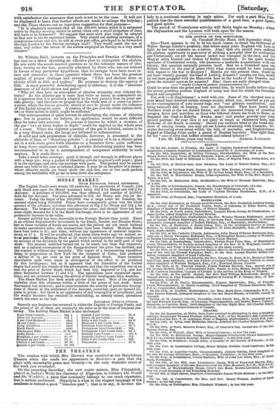Dr. William Reid, lecturer on the Principles and Practice of
Medicine, has sent us a letter sketching an effective plan to extinguish the cholera. He sets aside the much-mooted question as to the intimate nature of cho- lera; resting on the fact, generally admitted by those who are not trained in favour of any particular hypothesis, that its ravages have been most se- vere and extensive in those :quarters where there has been the greatest neglect of proper drainage and sewerage. " Filth and cholera Seem as closely allied as filth and typhus." He proposes to destroy the agency of filth. A most powerful disinfecting agent is chlorine; it is the " absolute destroyer of all fetid odours and gases."
" Why not then have an atmosphere of chlorine streaming over infected dis- tricts? As the chlorine gas is more than twice as heavy as atmospheric air, it is apparent that it is peculiarly adapted to the very purpose from its great spe- cific gravity; and therefore we propose that the whole area of a court-a lane- a street, where the disease prevails, should at once be placed under the influence of this highly energetic agent. A stratum of the gas over the whole surface-level, two or three inches in depth, might be sufficient.' Our correspondent is quite correct in calculating the virtues of chlorine gas; but in practice, we believe, its application would be more difficult than he takes into account. No process is known by which a stratum of the gas " two or three inches in depth " could be applied to the whole area of a court. When the slightest quantity of the gas is inhaled, unless it be is a very diluted state, the lungs are irritated to inflammation.
A mild and safe preparation of chloride, however, is presented in the chloride of lime, or " bleaching powder ": a quantity of it on a dinner-plate set in a sick-room gives forth chlorine in a harmless form, quite sufficient to keep down unpleasant smells. A portable disinfecting packet has been recommended to us by a correspondent of competent authority in such matters. It is made thus- Take a small letter-envelope: prick it through and through in different places with a large pin: wrap a packet of bleaching-powder in grocer's soft paper ; place it in the envelope, and close the envelope with paste. This packet may be carried about and held to the nose in infected places; it may lie on the pillow of a sleeper; where offensive smells are found about the sick-bed, one or two such packets among the bedclothes will go far to keep down the annoyance.


























 Previous page
Previous page